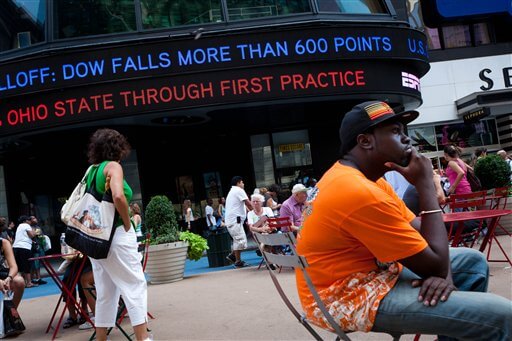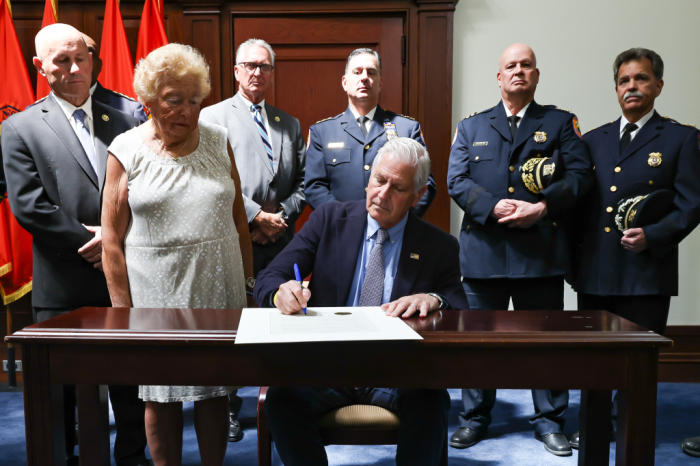
It’s the last thing a nervous consumer and a fragile economy needed: a confidence-killing nosedive on Wall Street.
Americans struggling with lean wages, job insecurity and high gasoline prices have seen a 15-percent plunge in stock prices shrink their 401(k) accounts over the past 2½ weeks. When consumers feel less wealthy, they’re less likely to buy new furniture, new appliances or new cars. And their spending drives about 70 percent of the economy.
Murray Specktor, 58, a retired Northwest Airlines pilot, says he has enough money tucked away to support himself in retirement. But after the stock market’s plunge, he’s taking further precautions.
“No expensive meals out,” he says. “Entertainment’s going to get cut back. Until I see where this is going, I’ve just got to preserve capital and try to get my comfort level up.”
The drop in the stock market, through Friday, could cut overall spending by $140 billion, or 1.3 percent, over the coming year, says Paul Dales, senior U.S. economist at Capital Economics. Dales forecasts that the stock market turmoil could reduce the economy’s annual growth rate by half a percentage point through 2012.
There isn’t much to spare. In the first half of the year, the economy grew at a scant 0.8 percent annual rate. That helps explain the dive on Wall Street: Stocks are falling partly on fears that the nation could slip back into a recession.
David Kelly, chief market strategist with J.P. Morgan Funds, said he fears the market drop will become “a self-fulfilling prophecy … and we’ll just scare ourselves into a recession.”
Tumbling stock prices could especially depress spending by wealthier consumers. Eighty percent of stocks belong to the richest 10 percent of Americans. And the richest 20 percent represent about 40 percent of consumer spending. Luxury retailers that have helped sustain the economy could suffer.
Even before stocks began dropping last month, consumers weren’t exactly exuberant. In June, they reduced spending for the first time in 20 months. The Rasmussen Consumer Index, drawn from a national survey, found Monday that 70 percent of Americans think the economy is worsening. That’s up from 45 percent at the start of the year.
The stock-market drop means “people will put off spending decisions, particularly for large-ticket items, and that will … reduce growth,” says Brian Gendreau, a market strategist with Cetera Financial Group and a finance professor at the University of Florida.
Rob Stein, senior portfolio manager at Astor Asset Management, worries that the stock market could remain depressed for months and hurt sales during the crucial holiday season. Still, he holds out hope.
Usually, “slowdowns based on market movements are temporary,” Stein says. “Just like high gas prices, you get used to it.”
James O’Sullivan, chief economist at MF Global, takes some comfort in what happened last year. Stocks plunged 14 percent between late April and early July on fears about Europe’s debt crisis.
“The economy lost a bit of momentum, but it didn’t go into recession, and it accelerated again before the end of the year,” O’Sullivan notes.
Joel Naroff of Naroff Economic Advisors says the damage to consumers’ psyche would have been worse years ago. But when the tech-stock bubble burst in 2000 and stocks tanked in 2008, “people lost an awful lot and became more conservative.”
Yet if the selloff in stocks continues, Naroff says, “it could convince people we’re heading toward another recession” — and perhaps turn the fears into reality.
Sentiment among consumers is especially critical because of the outsize impact of their spending. But plunging stocks also hurt business confidence.
Companies whose share prices have sunk can’t raise as much money by issuing shares to the public. Some will delay initial public offerings that would have generated cash they could have used to expand and hire.
U.S. companies are sitting on about $2 trillion in cash. Economists say their reluctance to spend that money is a big reason the economy is still sputtering.
The stock market turmoil is likely to remind many executives of the 2008 financial crisis. Even big, profitable corporations had trouble getting short-term loans. Fears that that could happen again could give companies another reason to hoard cash.
“It just reinforces the hesitation” of companies to hire and invest, says Diane Swonk, chief economist at Mesirow Financial. The market’s drop “validates large corporations’ decision to hold cash.”
Mainly, though, they’re waiting for consumers to start spending freely again. It may take a while.
Patrick Sheehan of Palm Springs, Calif., says the stock plunge has “caused a lot of hysteria in people.” Sheehan, co-creator of a documentary film festival, says he and his wife have already cut spending.
“We’re bracing for the next storm,” he says.
Technology consultant Greg Schulz of Stillwater, Minn., spent about $200 on memory and a hard drive for his computer a few days ago, even as the stock market was falling. He’s still spending on essentials. But the market’s continued fall has caused him to avoid any extravagances.
“I found a good bargain,” Schulz said of the computer gear that will help him do his job better. “But am I going to go out and buy that new 80-inch 3D TV? Nope.”
___
AP Business Writers Christopher S. Rugaber and Daniel Wagner in Washington, Joshua Freed in Minneapolis, Rachel Metz in San Francisco and Christopher Leonard in St. Louis contributed to this report.
Copyright 2011 The Associated Press.



































